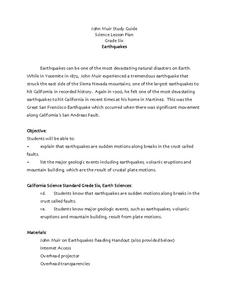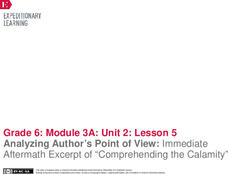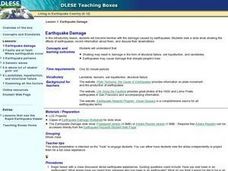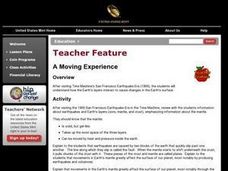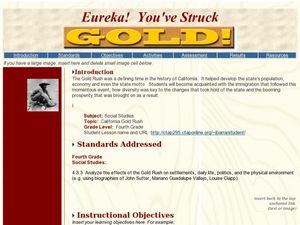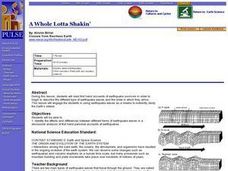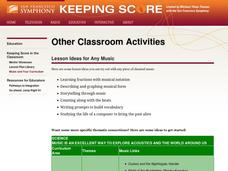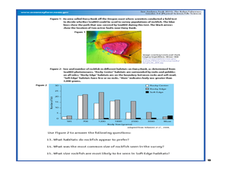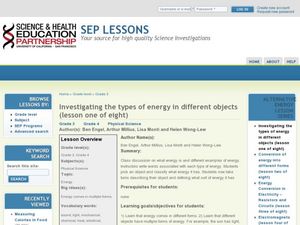EngageNY
Researching Facts
How did the 1906 San Francisco earthquake and fire affect the city's inhabitants? Scholars embark on a quest to discover the answer as they work in small groups to research articles about the event. They finish by completing a jigsaw...
Curated OER
Earthquakes
Sixth graders explain that earthquakes are sudden motions along breaks in the crust called faults. They list the major geologic events including earthquakes, volcanic eruptions and mountain building, which are the result of crustal plate...
Curated OER
Earthquakes
Sixth graders explore reasons for earthquakes. They discuss and describe the types of faults. Using the internet, 6th graders research a specific location of a former earthquake. They describe the damage, magnitude, the epicenter,...
EngageNY
Analyzing Author’s Point of View: Immediate Aftermath Excerpt of “Comprehending the Calamity"
Analyze that! Scholars continue reading and analyzing a primary source about the immediate aftermath of the 1906 San Francisco fire and earthquake. Then, individuals use graphic organizers to identify the author's point of view.
Curated OER
Earthquake Damage
Students identify that shaking may result in damage in the form of structural failure, soil liquefaction, and landslides. They also identify that earthquakes can cause damage that disrupts people's lives. Finally, students view a...
Curated OER
A Moving Experience
Students visit Time Machine's San Francisco Earthquake Era. They understand how the Earth's layers interact to cause changes in the Earth's surface. They review information about earthquakes and Earth's layers.
Curated OER
Living on a Fault
In this earthquake worksheet, students fill in 9 blanks with given terms related to earthquake fault zones, earthquakes and safety related to earthquakes. They also answer 4 questions about earthquake zones, building codes and highway...
Curated OER
Hazards: Second Grade Lesson Plans and Activities
Equip learners with safety knowledge in the case of an earthquake. After coloring the places to go to get help after a quake, and label places that wouldn't be safe to go after a quake, young geologists simulate three levels of...
Curated OER
October 17th Writing Prompt
In this writing prompt worksheet, students learn that the 1989 San Francisco earthquake took place on October 17th. Students use 5 resources in the classroom to summarize 5 facts that they learn about what causes earthquakes.
Curated OER
1906 Earthquake
Pupils explore the impact of the 1906 earthquake on the population of San Jose. They explore two different perspectives of earthquakes. Students write a news bulletin as if they were reporting on the earthquake. They are then divided...
Curated OER
A Disaster in the Making
Students compare the consequences of the 1906 earthquake in San Francisco to Hurricane Katrina's impact on New Orleans as a basis for investigating the transformative effect of infamous United States natural disasters.
Curated OER
Quake Clues
Students study earthquakes and how sediment accumulations are used for past information on earthquakes. For this earthquake lesson students interpret sediment cores and describe turbidites.
Curated OER
Eureka! You've Struck
While incomplete, this lesson could provide ideas for a lesson on the California gold rush. Learners look at a chart to analyze population growth in San Francisco after the discovery of gold, analyze political changes that occurred, and...
Curated OER
A Whole Lotta Shakin'
Students read first hand accounts of earthquake survivors in order to begin the describe the different types of earthquake waves and the order in which they arrive. They engage in using earthquake waves as a means to indirectly study the...
Curated OER
Dangerous Earth
Middle schoolers view a Dangerous Earth video and research a historic or recent earthquake. In this earthquake lesson students create a piece of are to portray the experience of their particular earthquake.
Curated OER
Plate Tectonics: Second Grade Lesson Plans and Activities
Second graders explore convection currents and how they relate to the movement of tectonic plates. Then, young geologists reconstruct Pangaea with a worksheet and pinpoint plate boundaries on a map using locations of earthquakes and...
Curated OER
Earthquakes
Students observe the melting of ice. In this phase change lesson, students observe ice as it melts. They discuss the process and create a Venn diagram comparing water and ice.
Curated OER
Magnitude of the Richter Scale
Students examine how a Richter scale operates. They create a booklet illustrating each rating on the scale. They discover how engineers use different measurement tools.
Curated OER
Volcanoes: Second Grade Lesson Plans and Activities
Young geologists explore volcanoes with a series of engaging geology activities. First, they learn the difference between magma and lava before coloring and labeling the parts of a volcano. During the lab, individuals watch a...
Curated OER
Craters are a Blast!
In this craters worksheet, students solve 3 problems including converting units of Joules into a number equivalent to a one-megaton nuclear bomb, finding the diameters of craters in a given picture and determining the energy needed to...
San Francisco Symphony
Lesson Ideas for Any Music
Music is a wonderful tool you can add to enhance the learning process for every subject. Here is a list of music selections that are categorized by subject, along with some neat teaching suggestions. You'll find songs suited to...
Curated OER
The Robot Fisherman
Students examine the use of robotic vehicles for fish surveys. For this ocean life lesson, students discuss the advantages and disadvantages of using underwater robots and the requirements an underwater robot must meet in order to...
Curated OER
Sonar Simulation
Young scholars compare and contrast side-scan sonar to other methods used to find objects underwater. In this underwater search lesson, students describe side-scan sonar and make inferences about the topography of an unknown landscape....
Curated OER
Investigating the Types of Energy in Different Objects
Young scholars investigate forms of energy. In this physical science energy lesson, students work with a partner classifying household items according to the type of energy they have. Young scholars complete a related worksheet.




